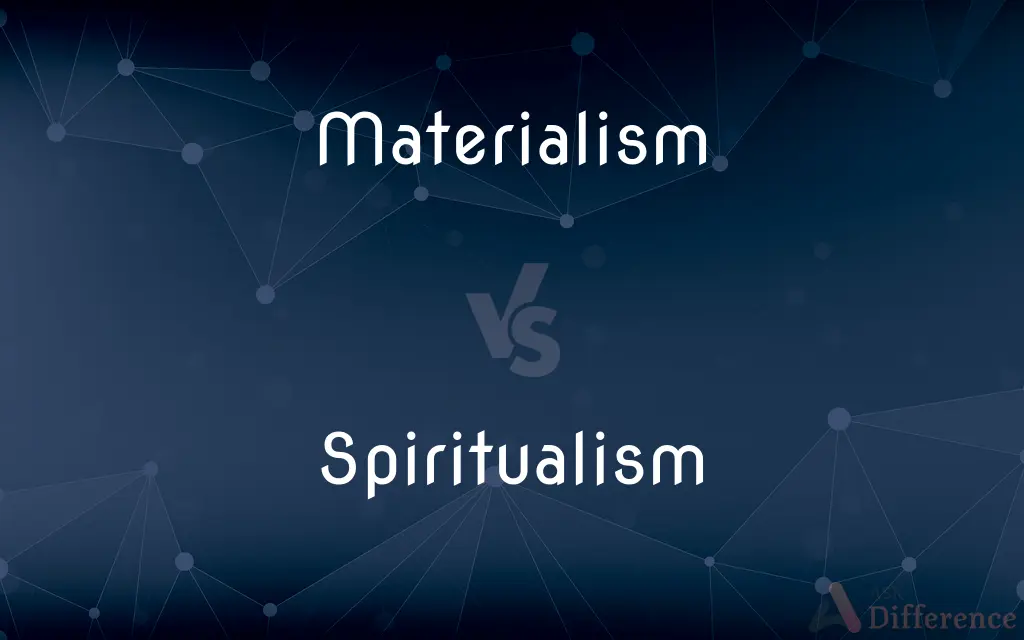Materialism vs. Spiritualism — What's the Difference?
By Fiza Rafique & Urooj Arif — Updated on April 4, 2024
Materialism focuses on physical and tangible aspects of existence, valuing possessions and wealth, whereas spiritualism emphasizes the importance of the soul, spirit, and intangible aspects of life, seeking meaning beyond material success.

Difference Between Materialism and Spiritualism
Table of Contents
ADVERTISEMENT
Key Differences
Materialism is a philosophy or attitude that prioritizes material possessions and physical comfort as the main goals of life. It revolves around the belief that tangible, physical objects and financial wealth constitute success and happiness. People who lean towards materialism often measure their own and others' worth by the accumulation of material goods and their lifestyle's outward appearance. Spiritualism, in contrast, is centered on the belief in the non-material aspects of existence, such as the soul, spirit, and the importance of personal growth, ethical values, and inner peace. It often involves seeking deeper meaning in life beyond material success and fostering connections with the self, others, and the universe or a higher power.
While materialism emphasizes the acquisition and possession of things as a path to happiness, spiritualism suggests that true contentment and fulfillment come from non-material sources, such as love, compassion, and inner harmony. Materialists may invest in goods and services that offer immediate gratification and social status, whereas spiritualists invest in experiences and practices that promote spiritual growth and understanding.
The conflict between materialism and spiritualism can be seen in the way individuals prioritize their time, energy, and resources. Materialistic values can lead to a focus on working to earn and spend, often at the expense of personal relationships and health. Spiritualism encourages a balance between material needs and spiritual well-being, advocating for simplicity, mindfulness, and the appreciation of life's non-material aspects.
In terms of societal impact, materialism is often linked with consumer culture, encouraging constant consumption and economic growth, sometimes at the expense of environmental sustainability and social equity. Spiritualism, on the other hand, may promote a more sustainable and equitable approach to living, emphasizing the well-being of all beings and the planet over individual material gain.
Despite their differences, materialism and spiritualism are not always mutually exclusive. Many individuals seek a balance between enjoying material comforts and nurturing their spiritual lives, recognizing that both material and spiritual well-being can contribute to a fulfilling life.
ADVERTISEMENT
Comparison Chart
Focus
Physical objects, wealth, and tangible success.
Soul, spirit, and intangible aspects of existence.
Goals
Acquisition of material goods, financial wealth.
Personal growth, inner peace, ethical values.
Happiness Source
Material possessions and outward success.
Non-material sources like love, compassion, inner harmony.
Societal Impact
Consumer culture, economic growth, environmental impact.
Sustainability, equity, well-being of all beings and the planet.
Life Approach
Working to earn and spend, prioritizing outward appearance.
Seeking balance, mindfulness, simplicity, and spiritual growth.
Compare with Definitions
Materialism
Wealth as Success.
In materialism, success is often measured by the amount and quality of possessions.
Spiritualism
Inner Peace.
Spiritualism values inner peace and harmony over material wealth.
Materialism
Immediate Gratification.
There's a focus on goods and services that offer immediate pleasure and status.
Spiritualism
Connection with the Universe.
There's a belief in a deeper connection with the universe or a higher power.
Materialism
Consumer Culture.
Materialism drives consumer culture, focusing on the latest trends and luxury goods.
Spiritualism
Mindfulness and Simplicity.
Practices like meditation and living simply are embraced to enhance spiritual understanding.
Materialism
Social Status.
Material wealth is used as a primary indicator of social status and success.
Spiritualism
Non-material Fulfillment.
Fulfillment comes from love, relationships, and personal growth.
Materialism
Physical Comfort.
High value is placed on physical comfort and luxurious living conditions.
Spiritualism
Ethical Living.
Living according to ethical values and principles is central to spiritualism.
Materialism
Materialism is a form of philosophical monism that holds that matter is the fundamental substance in nature, and that all things, including mental states and consciousness, are results of material interactions. According to philosophical materialism, mind and consciousness are by-products or epiphenomena of material processes (such as the biochemistry of the human brain and nervous system), without which they cannot exist.
Spiritualism
Spiritualism is a religious movement based on the belief that the spirits of the dead exist and have both the ability and the inclination to communicate with the living. The afterlife, or the "spirit world", is seen by spiritualists, not as a static place, but as one in which spirits continue to evolve.
Materialism
(Philosophy) The doctrine that physical matter is the only reality and that everything, including thought, feeling, mind, and will, can be explained in terms of matter and physical phenomena.
Spiritualism
The belief that the dead communicate with the living, as through a medium.
Materialism
The theory or attitude that physical well-being and worldly possessions constitute the greatest good and highest value in life.
Spiritualism
The practices or doctrines of those holding such a belief.
Materialism
Concern for possessions or material wealth and physical comfort, especially to the exclusion of spiritual or intellectual pursuits.
Spiritualism
A philosophy, doctrine, or religion emphasizing the spiritual aspect of being.
Materialism
Constant concern over material possessions and wealth; a great or excessive regard for worldly concerns.
Spiritualism
(philosophy) A doctrine, opposing materialism, that claims transcendency of the divine being, the altogether spiritual character of reality and the value of inwardness of consciousness.
Materialism
(philosophy) The philosophical belief that nothing exists beyond what is physical.
Spiritualism
A belief that the dead communicate with the living, especially through a medium. Used in a broader sense than spiritism/Kardecism.
Materialism
Material substances in the aggregate; matter.
Spiritualism
The quality or state of being spiritual.
Materialism
The doctrine of materialists; materialistic views and tenets; called also philosophical materialism.
The irregular fears of a future state had been supplanted by the materialism of Epicurus.
Spiritualism
The quality or state of being spiritual.
Materialism
The tendency to give undue importance to material interests as contrasted with spiritual concerns; devotion to the material nature and its wants.
Spiritualism
The doctrine, in opposition to the materialists, that all which exists is spirit, or soul - that what is called the external world is either a succession of notions impressed on the mind by the Deity, as maintained by Berkeley, or else the mere educt of the mind itself, as taught by Fichte.
Materialism
Material substances in the aggregate; matter.
Spiritualism
A belief that departed spirits hold intercourse with mortals by means of physical phenomena, as by rappng, or during abnormal mental states, as in trances, or the like, commonly manifested through a person of special susceptibility, called a medium; spiritism; the doctrines and practices of spiritualists.
What is called spiritualism should, I think, be called a mental species of materialism.
Materialism
A desire for wealth and material possessions with little interest in ethical or spiritual matters
Spiritualism
(theology) any doctrine that asserts the separate existence of God
Materialism
(philosophy) the philosophical theory that matter is the only reality
Spiritualism
The belief that the spirits of dead people can communicate with people who are still alive (especially via a medium)
Spiritualism
Concern with things of the spirit
Common Curiosities
Can someone be both materialistic and spiritual?
Yes, many people find a balance between enjoying material comforts and pursuing spiritual fulfillment.
What societal impacts do materialism and spiritualism have?
Materialism can drive consumerism and impact the environment, while spiritualism promotes sustainability and well-being.
What distinguishes materialism from spiritualism?
Materialism focuses on tangible success and possessions, while spiritualism values the intangible, like personal growth and inner peace.
Are there any common misconceptions about spiritualism?
A common misconception is that spiritualism completely rejects material possessions, but many spiritual practices simply advocate for balance and not attachment.
Can pursuing materialism lead to happiness?
While material possessions can provide temporary satisfaction, they often do not lead to long-term fulfillment.
How does one practice spiritualism in a materialistic society?
Practicing mindfulness, focusing on personal values, and finding fulfillment in relationships and personal growth can help.
How do materialism and spiritualism affect personal happiness?
Materialism ties happiness to possessions and status, whereas spiritualism finds joy in non-material aspects of life.
How can spiritualism contribute to a healthier society?
By promoting ethical living, compassion, and sustainability, spiritualism can lead to a more equitable and caring society.
How do materialism and spiritualism influence relationships?
Materialism might prioritize status and wealth in relationships, whereas spiritualism focuses on deeper emotional and spiritual connections.
Can materialism affect mental health?
Yes, an excessive focus on materialism can lead to stress, anxiety, and a sense of emptiness.
What role does consumer culture play in materialism?
Consumer culture reinforces materialism by emphasizing the importance of acquiring the latest goods for happiness and status.
Is spiritualism tied to religion?
While spiritualism can be part of religious beliefs, it can also be practiced independently of any religious framework.
What practices can enhance spiritual growth?
Practices like meditation, yoga, volunteering, and spending time in nature can enhance spiritual understanding and growth.
Is it necessary to give up material possessions to be spiritual?
No, spiritualism isn’t about renouncing material goods but rather about not letting them dictate one's happiness or self-worth.
How does spiritualism view success?
Spiritualism views success as achieving personal growth, inner peace, and living in harmony with one's values and the world.
Share Your Discovery

Previous Comparison
Distance vs. Mileage
Next Comparison
Inset vs. OffsetAuthor Spotlight
Written by
Fiza RafiqueFiza Rafique is a skilled content writer at AskDifference.com, where she meticulously refines and enhances written pieces. Drawing from her vast editorial expertise, Fiza ensures clarity, accuracy, and precision in every article. Passionate about language, she continually seeks to elevate the quality of content for readers worldwide.
Co-written by
Urooj ArifUrooj is a skilled content writer at Ask Difference, known for her exceptional ability to simplify complex topics into engaging and informative content. With a passion for research and a flair for clear, concise writing, she consistently delivers articles that resonate with our diverse audience.
















































